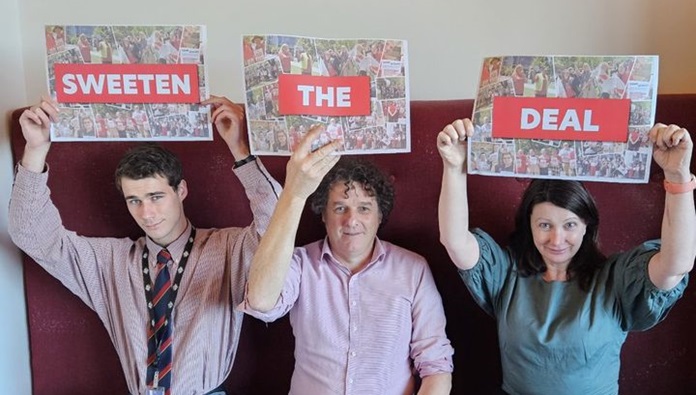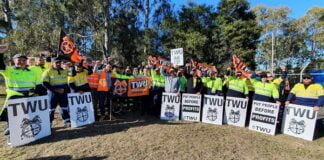After four months of fragmented but defiant industrial action, Commonwealth public servants have accepted the latest government pay offer of 11.2 per cent over three years, plus a 0.92 per cent sign-on bonus.
The deal falls well short of the Community and Public Sector Union’s claim of 20 per cent. Members voted 67.5 per cent in favour with 32.5 per cent against in the third union indicative poll in November, demonstrating significant dissatisfaction despite a recommendation by the union officials.
While the CPSU officials celebrated the Labor government’s post-election agreement to bargain for service-wide pay and core conditions, the results were less than spectacular.
It would be easy to write off the disappointing deal as inevitable because the CPSU had not taken strike action in eight years and many members had never taken part in industrial action. However, strikes by other unions have shown that strong member-led campaigns can win decent pay rises.
Industrial action
In the past, public service-wide bargaining was directed by regular mass meetings in each state. But this time around members had almost no role and even delegates were reduced to attending virtual “updates”.
This top-down approach undermined the campaign. While 86 per cent of members voted in June against the government’s initial offer of 10.5 per cent in the union’s first indicative poll, this did not translate to members being convinced to take industrial action—only 56.9 per cent of members in Services Australia participated in their protected action ballot.
To get members on side to take industrial action, delegates needed to have patiently made the case for industrial action over time, which did not consistently occur.
Instead of opening the campaign to more democracy, the officials doubled down on their top-down approach. They started the industrial campaign at Services Australia with AUX code bans for Smart Centre workers. (AUX codes are used to track the time a worker has deliberately chosen to not accept calls or process applications.)
However, in many sites the most experienced delegates were in the Service Centre not the Smart Centre. Not seeing their most experienced delegates take industrial action with them sapped the confidence of members in the Smart Centre, leading them to weaken their participation in the bans.
Members were also dumbstruck by the officials’ decision to hold their first one-hour stoppage at 4pm, which would shut Centrelink Service Centres to customers for only half an hour.
The lack of a serious campaign saw a small majority accepting the deal in the second indicative union poll. However, this was uneven, with a few agencies voting strongly against the offer.
The officials were worried they could not carry a vote for the deal in these agencies and overrode the poll results, immediately announcing a 24-hour strike at Services Australia even thought it was not one of the agencies which had strongly rejected the offer.
The officials pushed on despite clear signs that their members were not willing to commit to such an escalation. In the end, only 10 per cent of all Services Australia staff and 33 per cent of Service Centre staff took part, with the vast majority of those on strike told to stay at home rather than picket.
Rank-and-file
Where activists organised locally during the strike, the results were better. Some workers in Services Australia, with the assistance of members from other departments and CPSU officials, held a galvanising protest outside the Canberra head office.
Delegates at the Department of Employment and Workplace Relations (DEWR) in Canberra also demonstrated initiative. In June 2023, when all other workplaces were waiting for bargaining to start, they started leafletting their offices once a week.
They extended this activist approach by creating a campaigning committee whose job was to involve as many members as possible to do point-of-entry leafletting, put up posters and to do desk drops across Canberra workplaces. This paid dividends with enough members involved to leaflet workplaces several times a week during the strike period.
Following the second indicative poll, delegates at the Fair Work Ombudsmen (FWO) took the matter into their own hands, phonebanking their members to find out how they voted and organising conversations with them about taking industrial action if the union rejected the offer.
Surprisingly, they found that an overwhelming majority of their members had voted to reject the offer, with many wanting to take industrial action. Even some who had voted to accept were willing to take industrial action in solidarity with colleagues who wanted a better offer.
This put enough pressure on the officials to allow FWO members to hold a protected action ballot. However, the officials were clear from the start that they did not intend to mount a serious industrial campaign, instead opting for a “short sharp strike campaign”.
The officials were hoping that strikes in smaller agencies would convince the government that the CPSU had a serious industrial campaign with plans for protected action ballots in 20-plus agencies.
Unfortunately, the government recognised that this was a way of extracting a face-saving concession rather than a real attempt at an industrial campaign that could win.
Lessons
The outcome of the campaign represented a missed opportunity. CPSU activists need to learn some lessons.
First, delegates need to take the initiative to rebuild a culture of holding members’ meetings among their immediate membership, to get feedback and to win a clear mandate for action.
Regular members’ meetings would have made it more difficult for the officials to refuse to do the paperwork when FWO delegates called a second stoppage.
Members’ meetings also create a space for discussion around social justice issues such as Palestine.
Second, delegates need the membership onside if they are to challenge or ignore the decisions of the official leadership.
Finally, delegates in DEWR and the ACCC should look to mobilise their members over their agency-level agreements and in all agencies over the way in which the new EBA is rolled out.
By a CPSU delegate






